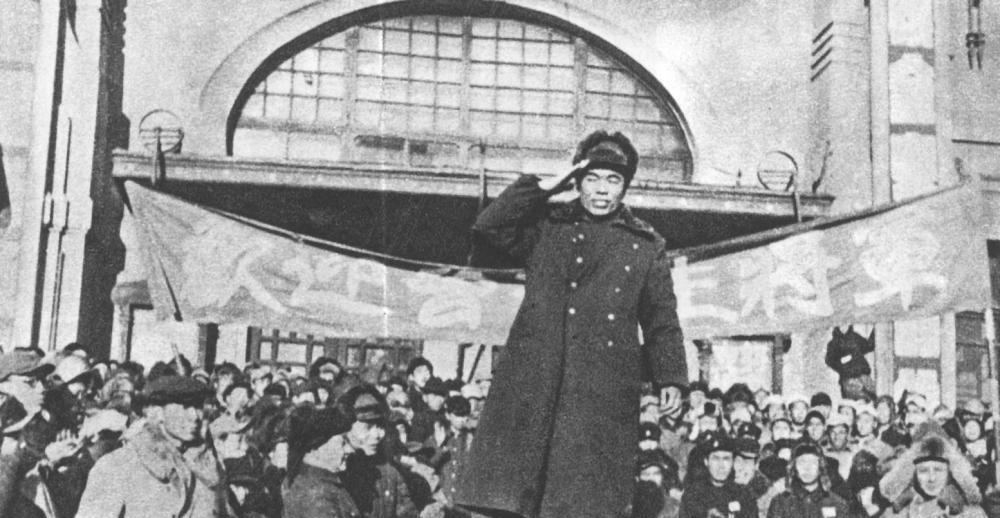In the history of modern revolutions, there have been many uprisings in the front, and the flag has been changed. Especially during the Liberation War, Kuomintang uprisings abounded. However, in the uprising, it was difficult to achieve the unanimous action of all the subordinate departments, and in the Changchun Uprising on October 16, 1948, Zeng Zesheng's 60th Army revolted, but all the divisions under its jurisdiction participated in the uprising, which was very rare.

The Kuomintang 60th Army was the starting force of the "King of Yunnan" Long Yun and Lu Han, and after the victory of the War of Resistance, it was transferred to Yunnan by Chiang Kai-shek and transported to the northeast battlefield by sea.
Compared with the "Central Army", the 60th Army is a miscellaneous army. Chiang Kai-shek's control over the miscellaneous army was carried out in the form of "mixing sand."
For example, the 60th Army has three divisions under its jurisdiction, namely the 182nd Division, the Provisional 21st Division, and the Provisional 52nd Division. The 182nd Division and the Provisional 21st Division were old units from Yunnan, while the Provisional 51st Division was Chiang Kai-shek's "sand" mixed with the 60th Army, which was formed by the Jilin Police Department of the Northeast Traffic Police General Bureau and the 4th Security District in the Northeast, and the division commander was Li Song, a hunan Anhuaren and a major general of the Nationalist Army.
After the 60th Army and Zheng Dongguo's Northeast "Suppression General" First Corps were besieged by our army for half a year in Changchun, the psychological pressure on the officers and men was enormous, because their current situation was that they could not win the battle, could not walk, could not hold, and had abnormal anxiety and uneasiness. Our army, through the comrades of the 184th Division, the rebel unit of the former 60th Army, carried out offensive tactics against them. This tactic played a prominent role in the officers and men of the 182nd Division and the Provisional 21st Division, and the division commanders supported the uprising. The attitude of the provisional 52nd Division was less clear.
In order to ensure that there were no flaws in the uprising and that the three divisions of the whole army could act in unison, Commander Zeng Zesheng decided to take extraordinary measures.
The day before the uprising, Zeng Zesheng called Li Song, commander of the 52nd Division, and at 11:00 p.m., the military headquarters held a combat meeting, asking you to bring three regimental commanders to participate, be sure to be on time! Subsequently, Commander Zeng called Zhang Weipeng, the adjutant director, and said that all other departments had already been implemented, that is, the 52nd Division had not yet. This Li Song doesn't like me to ask about his internal situation in ordinary days, he may become an obstacle to this uprising, and calling you this time is to solve this problem.
Zhang Weipeng asked, how to solve?
Commander Zeng said that I had already informed him that I had taken three regimental commanders to the military headquarters to attend the operational meeting at 11 p.m. this evening, and that you and Jiang Biwu, director of the Political Work Department, would accompany them and disarm them at 11:00 p.m., and then hand over this letter to him and formally inform him that the 60th Army had decided to oppose Chiang Kai-shek's uprising, and asked him to call the deputy commander of the 52nd Division and the deputy commanders of the regiments to obey the orders of the military department and accompany the army in the uprising.
Soon after Zeng Zesheng made arrangements, Li Song came to the military headquarters with the three regimental commanders under his command.
Zhang Weipeng, Jiang Biwu and others welcomed them to the bedroom of Commander Zeng and waited. At 11:00 a.m., Zhang Weipeng took out the commander's warrant and handed it to Li Song. Li Song looked at it, and although he was afraid in his heart, he still said that he obeyed the orders of the military commander. He also called Ouyang Wu, the deputy division commander, and asked the deputy division commander to bring the deputy commander to the military headquarters to accept orders.
As soon as the deputy division commander arrived at the military headquarters, this was the case, and even if there were a thousand unwilling people in his heart, he could only act according to the rules, and then led his troops to revolt with Zeng Zesheng.
In the old army, the appointment of private individuals was not only open and universal, but also legitimate, reasonable and legal. Which of these who are in charge of the army, divisions, and regiments, do not have several loyal "King Kongs" around them? Which of his subordinates did not serve the death of a gang of "Taibao"? And once their revered chiefs are taken hostage, they are not afraid of disobedience.
Zeng Zesheng's move was really powerful.
In this way, Zeng Zesheng declared an uprising on October 16, 1948, and realized the uprising of the whole army. After Zeng Zesheng's troops and our army achieved a change of defense, it also prompted General Zheng Dongguo, acting commander-in-chief of northeast security, to break away from Chiang Kai-shek's camp.
More Exciting Articles:
He was the deputy commander of the Nationalist Army, determined to be a good person, and as a result, his wife gave birth by borrowing money, and later rebelled and was awarded lieutenant general
Zeng Zesheng's department of the Changchun Uprising was later reorganized into the 50th Army, and who were the division commanders and political commissars under its jurisdiction?